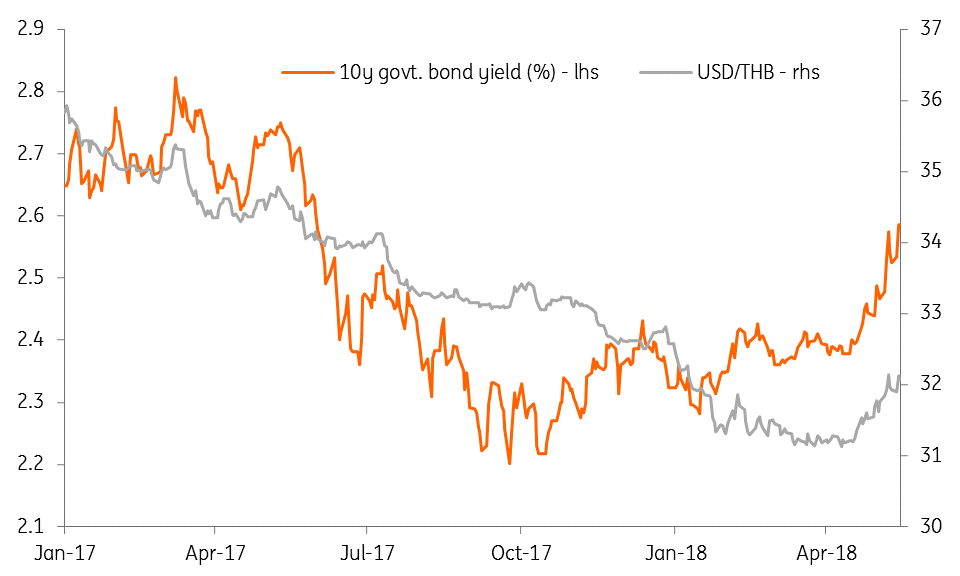Thailand’s central bank leaves policy on hold
We maintain our view of no change to the Bank of Thailand policy anytime soon
We recently revised our USD/THB forecast for end-2018 to 32.3 from 31.0. However, just as for most other emerging market currencies, the new forecast could become stale sooner rather than later. We maintain our view of no change to the BoT policy anytime soon.
| 1.5% |
BoT policy rateNo change |
| As expected | |
On-hold monetary policy
As widely expected, The Bank of Thailand’s (BoT) monetary policy committee unanimously decided to leave policy unchanged at the meeting held today. The decision comes as the Thai baht (THB) weakened 3% against the US dollar over one month, while there were no other economic motives for change from an on-hold policy stance that’s been in place for over three years now. The last policy move was a 25bp cut to the policy rate to 1.50% in April 2015, marking the end of that easing cycle.
Weakening currency
The 16% THB appreciation against USD from end-2016 through April this year allows the central bank to accommodate some depreciation pressure. The broad USD strength and outflows from the local bond market since April are associated with a 3% depreciation of the THB above the 32 level against USD. The hit to local currency bonds is evident in a 20bp spike in the 10-year yield, the steepest selloff since late 2016.
Today’s policy statement noted that, “In the period ahead, the baht would likely remain volatile mainly due to uncertainties pertaining to monetary, fiscal and foreign trade policies among major advanced economies.”
The only support for the currency is the prevalence of large current account surpluses, which amounted to $48bn or about 11% of GDP in each of the last two years, and at $17bn in the first quarter of 2018 was $2bn wider on the year.
Slow growth, low inflation
Thailand’s GDP growth is poised to moderate as the data for the first quarter of 2018 is expected to show next week (May 21), while inflation remains negligible at 1.1% in April or close to the low end of the BoT’s 1-4% medium-term target. As elsewhere, high household debt further constrains any monetary tightening along the way.
With expectations of these trends continuing, we aren’t forecasting any change to the BoT policy for the rest of the year.
Weakening government bonds and THB

Download
Download article
17 May 2018
Good MornING Asia - 17 May 2018 This bundle contains {bundle_entries}{/bundle_entries} articles"THINK Outside" is a collection of specially commissioned content from third-party sources, such as economic think-tanks and academic institutions, that ING deems reliable and from non-research departments within ING. ING Bank N.V. ("ING") uses these sources to expand the range of opinions you can find on the THINK website. Some of these sources are not the property of or managed by ING, and therefore ING cannot always guarantee the correctness, completeness, actuality and quality of such sources, nor the availability at any given time of the data and information provided, and ING cannot accept any liability in this respect, insofar as this is permissible pursuant to the applicable laws and regulations.
This publication does not necessarily reflect the ING house view. This publication has been prepared solely for information purposes without regard to any particular user's investment objectives, financial situation, or means. The information in the publication is not an investment recommendation and it is not investment, legal or tax advice or an offer or solicitation to purchase or sell any financial instrument. Reasonable care has been taken to ensure that this publication is not untrue or misleading when published, but ING does not represent that it is accurate or complete. ING does not accept any liability for any direct, indirect or consequential loss arising from any use of this publication. Unless otherwise stated, any views, forecasts, or estimates are solely those of the author(s), as of the date of the publication and are subject to change without notice.
The distribution of this publication may be restricted by law or regulation in different jurisdictions and persons into whose possession this publication comes should inform themselves about, and observe, such restrictions.
Copyright and database rights protection exists in this report and it may not be reproduced, distributed or published by any person for any purpose without the prior express consent of ING. All rights are reserved.
ING Bank N.V. is authorised by the Dutch Central Bank and supervised by the European Central Bank (ECB), the Dutch Central Bank (DNB) and the Dutch Authority for the Financial Markets (AFM). ING Bank N.V. is incorporated in the Netherlands (Trade Register no. 33031431 Amsterdam).